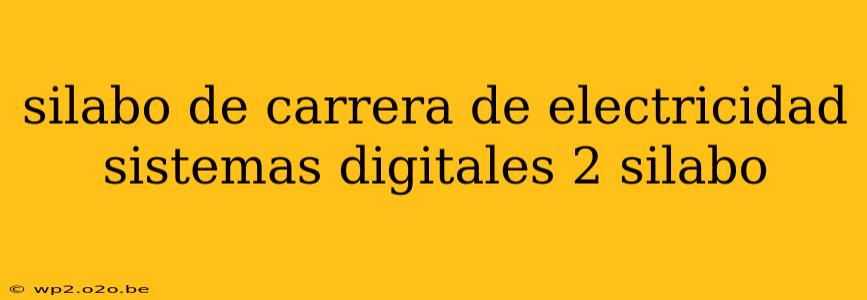Silabo de Carrera de Electricidad: Sistemas Digitales 2
This syllabus outlines the curriculum for Sistemas Digitales 2 (Digital Systems 2) within an Electrician's career program. The course builds upon the foundational knowledge gained in Sistemas Digitales 1, delving deeper into advanced digital logic design, microcontrollers, and their applications in electrical systems.
Course Description:
This course provides a comprehensive understanding of advanced digital systems, focusing on the design, implementation, and application of complex digital circuits and microcontrollers. Students will learn to analyze, design, and troubleshoot sophisticated digital systems, preparing them for advanced roles in the electrical industry. Emphasis will be placed on practical application and hands-on experience.
Course Objectives: Upon successful completion of this course, students will be able to:
- Analyze and design complex combinational and sequential logic circuits: This includes understanding and applying advanced techniques like state machines, counters, and shift registers.
- Program and utilize microcontrollers in various applications: Students will gain proficiency in programming microcontrollers using C or assembly language, focusing on real-world applications within electrical systems.
- Implement and troubleshoot digital systems using various technologies: This encompasses different hardware platforms, including programmable logic devices (PLDs) and field-programmable gate arrays (FPGAs).
- Understand and apply digital signal processing (DSP) fundamentals: Basic concepts of digital signal processing will be introduced, connecting the theoretical to practical applications.
- Work effectively in teams to design and implement digital system projects: Collaboration and teamwork will be emphasized throughout the course.
- Develop effective problem-solving skills in the context of digital systems: Students will be challenged to troubleshoot and debug complex circuits and code.
Course Content:
The course will cover the following topics:
Module 1: Advanced Combinational Logic Design
- Minimization techniques (Karnaugh maps, Quine-McCluskey)
- Arithmetic circuits (adders, subtractors, multipliers)
- Code converters and decoders
- Multiplexers and demultiplexers
Module 2: Advanced Sequential Logic Design
- State machines (Moore and Mealy machines)
- Counters (synchronous and asynchronous)
- Shift registers (various types and applications)
- Memory devices (RAM, ROM)
Module 3: Microcontroller Programming and Applications
- Introduction to microcontrollers (architecture, peripherals)
- C programming for microcontrollers
- Interfacing with sensors and actuators
- Real-time applications (control systems, data acquisition)
Module 4: Programmable Logic Devices (PLDs) and FPGAs
- Introduction to PLDs and FPGAs
- Hardware description languages (VHDL or Verilog)
- Design and implementation of digital systems using PLDs/FPGAs
Module 5: Introduction to Digital Signal Processing (DSP)
- Digital signal representation
- Basic DSP algorithms (filtering, sampling)
- Applications of DSP in electrical systems
Assessment:
- Laboratory Assignments (40%): Hands-on projects focusing on the design, implementation, and testing of digital circuits and microcontroller applications.
- Quizzes (20%): Regular quizzes to assess understanding of concepts.
- Midterm Exam (20%): Comprehensive examination covering the first half of the course.
- Final Exam (20%): Comprehensive examination covering the entire course.
Required Materials:
- Textbook: (Specify relevant textbook here)
- Microcontroller development kit (Specify kit here)
- Laboratory equipment (Specify equipment here)
Instructor: (Instructor Name and Contact Information)
Office Hours: (Office Hours)
This syllabus is subject to change at the instructor's discretion. Students will be notified of any changes in a timely manner. Active participation and consistent effort are crucial for success in this course. Please do not hesitate to contact the instructor with any questions or concerns.

